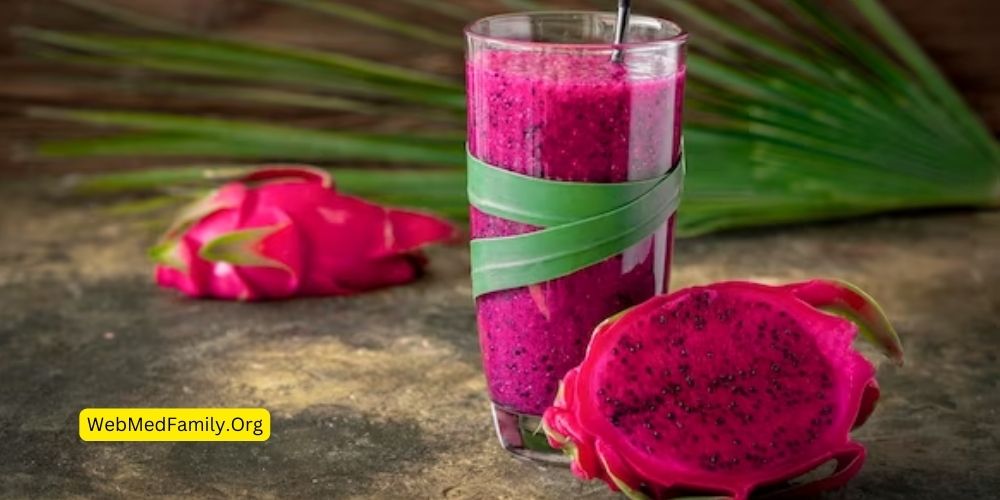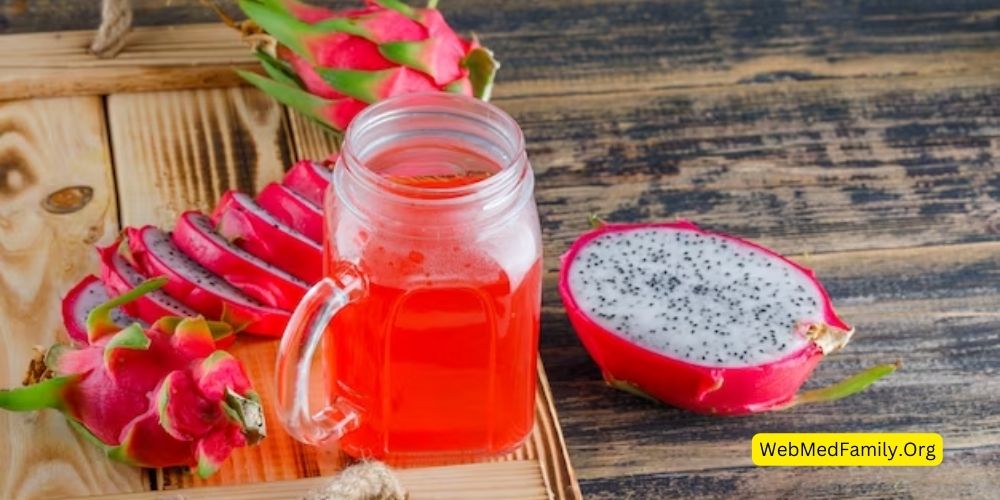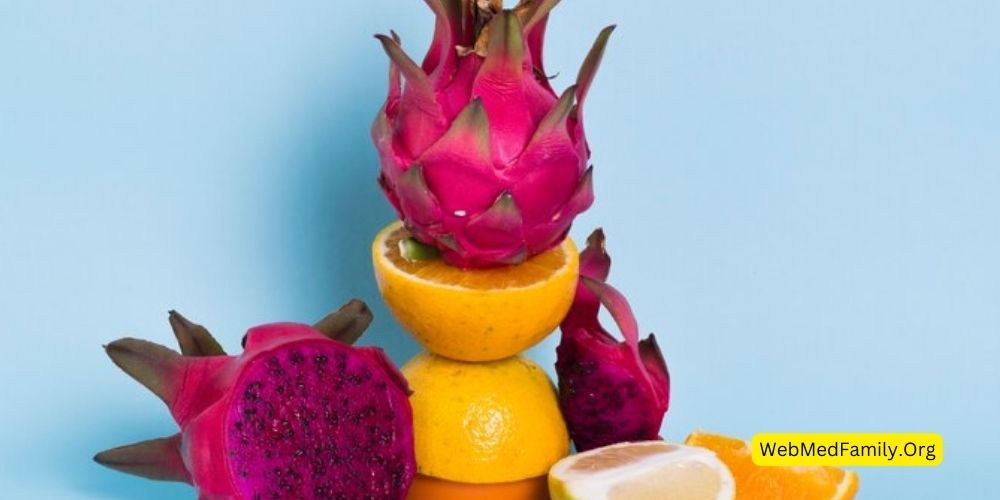One of the most notable vitamins found in dragon fruit is vitamin C. A 100-gram serving of dragon fruit contains about 34% of the recommended daily intake of vitamin C. This powerful antioxidant helps protect the body from free radical damage, supports a healthy immune system, and promotes healthy skin.
Additionally, dragon fruit is a good source of vitamin B6, which is important for brain function and the production of red blood cells – Source: Healthline
In addition to vitamin C and B6, dragon fruit also contains other essential vitamins such as vitamin A, vitamin E, and vitamin K. Vitamin A is important for maintaining healthy eyesight, while vitamin E helps protect the body from oxidative stress.
Vitamin K is essential for blood clotting and bone health.
Dragon fruit is a nutrient-dense fruit that can provide a variety of vitamins and minerals to support overall health and well-being.
Let’s dig more about this fruit here…
Contents:
Dragon Fruit Key Vitamins
Dragon fruit is low in calories and high in nutrients, making it an excellent addition to a balanced diet. It is a good source of fiber, vitamin C, and several other vitamins and minerals.
Here are some key vitamins and minerals found in dragon fruit:
- Vitamin C: Dragon fruit is an excellent source of vitamin C, with one cup providing about 34% of the daily recommended intake. Vitamin C is an antioxidant that helps protect cells from damage and plays a role in immune function.
- Iron: Dragon fruit contains iron, which is important for the production of red blood cells and the transport of oxygen in the body.
- Magnesium: This mineral is involved in many processes in the body, including muscle and nerve function, blood sugar control, and blood pressure regulation. Dragon fruit is a good source of magnesium.
- Vitamin B6: Dragon fruit contains vitamin B6, which is important for brain development and function, as well as the production of hormones and red blood cells.
Vitamin A in Dragon Fruit
Dragon fruit is a good source of vitamin A, which is essential for maintaining healthy vision, skin, and immune function. One serving of dragon fruit contains approximately 100 international units (IU) of vitamin A, which is about 4% of the recommended daily intake for adults.
Vitamin A is a fat-soluble vitamin that is important for maintaining the health of the eyes and skin. It is also essential for immune function, growth and development, and reproductive health.
Dragon fruit is particularly rich in beta-carotene, which is a type of carotenoid that is converted into vitamin A in the body. Beta-carotene is also a powerful antioxidant that can help protect the body against oxidative stress and inflammation.
Including dragon fruit in your diet can help you meet your daily vitamin A needs and support overall health and well-being.
However, it is important to note that consuming too much vitamin A can be harmful, so it is important to consume dragon fruit and other vitamin A-rich foods in moderation.

B Vitamins in Dragon Fruit
Dragon fruit is a tropical fruit that is known for its unique appearance and delicious taste. In addition to being a tasty treat, it is also a good source of various vitamins and minerals. One group of vitamins that dragon fruit is particularly rich in is B vitamins.
Thiamine (B1)
Thiamine, also known as vitamin B1, is an essential nutrient that is important for the proper functioning of the nervous system and the metabolism of carbohydrates. Dragon fruit is a good source of thiamine, with a 100-gram serving providing approximately 0.04 milligrams of thiamine, which is about 3% of the recommended daily intake.
Riboflavin (B2)
Riboflavin, also known as vitamin B2, is another important B vitamin that is needed for the metabolism of carbohydrates, proteins, and fats. It is also involved in the production of red blood cells and the maintenance of healthy skin, hair, and nails. Dragon fruit is a good source of riboflavin, with a 100-gram serving providing approximately 0.05 milligrams of riboflavin, which is about 4% of the recommended daily intake.
Niacin (B3)
Niacin, also known as vitamin B3, is an important nutrient that is involved in the metabolism of carbohydrates, fats, and proteins. It is also important for the proper functioning of the nervous system and the maintenance of healthy skin. Dragon fruit is a good source of niacin, with a 100-gram serving providing approximately 0.4 milligrams of niacin, which is about 3% of the recommended daily intake.
Overall, dragon fruit is a good source of B vitamins, particularly thiamine, riboflavin, and niacin. Incorporating this delicious fruit into your diet can help ensure that you are getting the nutrients you need to stay healthy and energized.
Vitamin C in Dragon Fruit
Dragon fruit is a great source of vitamin C. In fact, a 100-gram serving of dragon fruit contains around 20% of the recommended daily intake of vitamin C. Vitamin C, also known as ascorbic acid, is a powerful antioxidant that helps protect cells from damage caused by free radicals.
Vitamin C is also essential for the production of collagen, a protein that helps keep skin, bones, and other tissues strong and healthy. It also plays a key role in the immune system by helping white blood cells function properly and fight off infections.
In addition to its antioxidant and immune-boosting properties, vitamin C also helps the body absorb iron from plant-based foods. This is especially important for vegetarians and vegans who may not consume as much iron as those who eat meat.
Antioxidant Properties of Dragon Fruit
Dragon fruit is rich in antioxidants, which are compounds that protect our cells from damage caused by free radicals. Free radicals are unstable molecules that can cause oxidative stress and lead to various diseases, including cancer, heart disease, and Alzheimer’s disease.
One of the main antioxidants found in dragon fruit is vitamin C. A 100-gram serving of dragon fruit contains about 34% of the daily recommended intake of vitamin C. Vitamin C is a water-soluble vitamin that acts as an antioxidant in the body, protecting cells from damage caused by free radicals.
In addition to vitamin C, dragon fruit also contains other antioxidants, such as betalains, carotenoids, and flavonoids. Betalains are a group of pigments that give dragon fruit its vibrant pink color. These pigments have been shown to have anti-inflammatory and antioxidant properties.
Carotenoids are another group of antioxidants found in dragon fruit. They are responsible for giving fruits and vegetables their bright colors. Some of the carotenoids found in dragon fruit include beta-carotene, lycopene, and zeaxanthin. These carotenoids have been shown to have anti-inflammatory and antioxidant properties and may help protect against certain types of cancer.
Finally, dragon fruit also contains flavonoids, which are a group of antioxidants found in many fruits and vegetables. Flavonoids have been shown to have anti-inflammatory, antioxidant, and anti-cancer properties. Some of the flavonoids found in dragon fruit include quercetin, kaempferol, and catechins.
Health Benefits of Dragon Fruit Vitamins
Dragon fruit is a nutrient-dense fruit that is loaded with vitamins and minerals. Here are some of the vitamins found in dragon fruit and their health benefits:
Vitamin C
Dragon fruit is an excellent source of vitamin C, a powerful antioxidant that helps to protect cells from damage caused by free radicals. Vitamin C also helps to boost the immune system, promote wound healing, and improve skin health.
Vitamin B1
Also known as thiamin, vitamin B1 is important for maintaining a healthy nervous system and promoting energy production. Dragon fruit is a good source of vitamin B1, which can help to reduce the risk of developing conditions such as Alzheimer’s disease and dementia.
Vitamin B2
Vitamin B2, also known as riboflavin, is important for maintaining healthy skin, eyes, and nervous system. Dragon fruit is a good source of vitamin B2, which can help to prevent and treat conditions such as migraines, cataracts, and acne.
Vitamin B3
Also known as niacin, vitamin B3 is important for maintaining healthy skin, nerves, and digestion. Dragon fruit is a good source of vitamin B3, which can help to lower cholesterol levels, reduce the risk of heart disease, and improve brain function.
Vitamin B6
Vitamin B6 is important for maintaining healthy brain function, promoting red blood cell production, and supporting immune system function. Dragon fruit is a good source of vitamin B6, which can help to reduce the risk of developing conditions such as depression, anemia, and asthma.
Overall, dragon fruit is a great source of vitamins that can help to maintain good health and prevent a range of conditions.

Dragon Fruit Consumption Recommendations
Dragon fruit is a nutritious fruit that is rich in vitamins and minerals. Consuming dragon fruit regularly can provide many health benefits. Here are some recommendations for consuming dragon fruit:
1. Choose Ripe Dragon Fruit
Choose ripe dragon fruit that is bright in color and has a firm texture. The fruit should not be too soft or too hard. Ripe dragon fruit is sweeter and has a more intense flavor.
2. Eat the Flesh and Seeds
The flesh and seeds of dragon fruit are both edible. The flesh is rich in fiber, while the seeds are a good source of healthy fats. Eating both can provide a balanced nutrient profile.
3. Incorporate Dragon Fruit into Your Diet
Dragon fruit can be eaten raw or cooked. It can be added to smoothies, salads, or used as a topping for yogurt or oatmeal. It can also be grilled or roasted for a unique flavor.
4. Consume in Moderation
While dragon fruit is a healthy fruit, it should be consumed in moderation. Eating too much dragon fruit can lead to digestive issues due to its high fiber content. It is recommended to consume no more than one to two servings per day.
Incorporating dragon fruit into your diet can provide many health benefits. By following these recommendations, you can enjoy the fruit in a balanced and healthy way.
Frequently Asked Question
What are the benefits of eating dragon fruit?

The benefits of eating dragon fruit include its rich nutritional profile and potential health advantages. Dragon fruit is packed with essential nutrients like vitamin C, iron, and magnesium, which contribute to a strong immune system, enhanced iron absorption, and improved bone health. Additionally, dragon fruit contains antioxidants that help protect against cell damage and may have anti-inflammatory properties. Moreover, the fruit’s high fiber content promotes healthy digestion and aids in weight management. However, further research is needed to fully understand and confirm these potential benefits.
Does dragon fruit improve fertility?

While dragon fruit is a nutritious addition to a well-balanced diet, there is limited scientific evidence supporting its direct impact on fertility. Certain nutrients present in dragon fruit, such as antioxidants and vitamin C, are generally associated with reproductive health. However, fertility is influenced by numerous factors, including genetics, overall diet, lifestyle choices, and medical conditions. It’s essential to maintain a varied and nutrient-rich diet, including dragon fruit, but it’s best to consult with a healthcare professional for personalized advice regarding fertility concerns.
Can I eat dragon fruit everyday?

Yes, incorporating dragon fruit into your daily diet can be a beneficial choice for your health. This tropical fruit is nutritious, low in calories, and packed with essential vitamins, minerals, and antioxidants. By consuming one dragon fruit per day, you can enhance your overall well-being and promote a healthy lifestyle. It’s important to maintain dietary variety and balance by consuming a wide range of fruits, vegetables, whole grains, lean proteins, and healthy fats. Moderation is key, and individuals with specific health conditions or dietary restrictions should consult with a healthcare professional or a registered dietitian for personalized recommendations. Read more
Does dragon fruit increase blood in the body?

Dragon fruit does not directly increase blood in the body. However, its iron content can contribute to maintaining healthy iron levels, which is crucial for the production of hemoglobin and red blood cells. Iron is an essential mineral involved in oxygen transport, and a deficiency can lead to anemia and related symptoms. While dragon fruit contains iron, it’s worth noting that the iron in plant-based foods is less readily absorbed compared to the iron found in animal sources. To enhance iron absorption, pairing dragon fruit with vitamin C-rich foods, such as citrus fruits or strawberries, can be beneficial.
Dragon fruit nutrition facts 100g?

The nutrition facts for dragon fruit per 100g vary slightly depending on the specific variety, but here are some approximate values based on general data: Dragon fruit typically contains around 60-70 calories, less than 1 gram of fat, about 9-14 grams of carbohydrates (including 1-5 grams of dietary fiber), and 1-2 grams of protein. It is also a good source of vitamin C, providing around 20% of the recommended daily intake. Furthermore, dragon fruit offers small amounts of essential minerals like iron, magnesium, and calcium.


